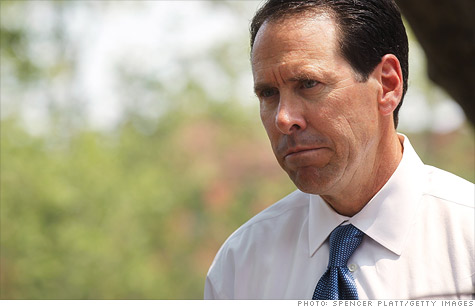
AT&T CEO Randall Stephenson won't have an easy time getting the proposed T-Mobile merger through the FCC.
NEW YORK (CNNMoney) -- The Federal Communications Commission on Tuesday blasted AT&T, accusing the telecom giant of lying about the benefits of its proposed merger with T-Mobile.
In its 109-page report on the proposal, the regulator states that AT&T's $39 billion acquisition of T-Mobile would not be in the public's interest, because the merger would "substantially lessen competition," limit consumers' choice in wireless providers and raise prices for mobile customers.
The report also found that AT&T was saying one thing publicly but telling a different story internally around its claims that the deal would create jobs and is necessary for AT&T to deploy next-generation wireless technology.
In the document, the FCC said its staff "identifie[d] internal AT&T documents and consistent historical practices that contradict AT&T's claim that merging with T-Mobile is essential for AT&T to build out its LTE network to 97% of Americans."
That's one of AT&T's central arguments in favor of its proposal.
The agency also found AT&T's claims that the deal would create U.S. jobs "to be inconsistent with AT&T's internal analyses."
In other words, the FCC thinks AT&T was lying to the public about the benefits of the merger.
The FCC released the report even though, in a surprise move, AT&T (T, Fortune 500) said on Thanksgiving that it is no longer seeking the regulator's approval for the merger. Many analysts say they believe that AT&T's withdrawal was in part an attempt to prevent the FCC from going public with its reasons for opposing the deal.
AT&T submitted its request to withdraw its application following the FCC's announcement last week that it would not approve the deal outright. Instead, it planned hold a public hearing -- a rare move signaling its disapproval.
The FCC said Tuesday that it has approved AT&T's withdrawal of its application to merge with rival T-Mobile. But FCC officials said the agency had been drafting a critical report for several months in anticipation of a hearing -- and they decided to release it.
It was a bold move from an agency that could have quietly backed away from a brawl over AT&T's proposed deal.
AT&T called the FCC's decision to release the report both "troubling" and "improper."
"This report is not an order of the FCC and has never been voted on," said Jim Cicconi, AT&T's head of external affairs, in an e-mailed statement. "It is simply a staff draft that raises questions of fact that were to be addressed in an administrative hearing, a hearing which will not now take place. It has no force or effect under law, which raises questions as to why the FCC would choose to release it."
AT&T has reason to be disgruntled: The FCC's move will further complicate its already troubled merger plan.
The FCC said it would submit an un-redacted version of its report to the U.S. Department of Justice, which sued AT&T for antitrust violations related to the proposed merger. A court trial is expected to begin in February.
AT&T also complained that the draft report had not been made available to the company prior to Tuesday, depriving it of the chance to prepare a response.
FCC officials countered by saying that substantial time, effort and money was spent on researching and drafting the report, and the agency didn't want to be seen as suppressing information.
The Commission also noted that AT&T should view the report as a kind of roadmap for what sort of deal could attain approval if AT&T seeks a different version of the merger in the future.
Though AT&T is still pursuing the merger, the FCC's harsh statements suggest that approval won't be easy. AT&T set aside $4 billion last week to cover the break-up fee it will owe Deutsche Telekom, T-Mobile's parent company, should the deal not go through.
But the FCC stopped short of telling AT&T that it would not approve the merger. The regulator had the option of allowing for the withdrawal of the merger application "with prejudice." That would have sent a clear message to AT&T: Don't come back in the future with any deal that resembles this one.
Instead, FCC officials said they will consider the proposal if AT&T returns with it.
But to get that far, AT&T will first have to vanquish the DOJ in court and prevail in the upcoming antitrust case. ![]()